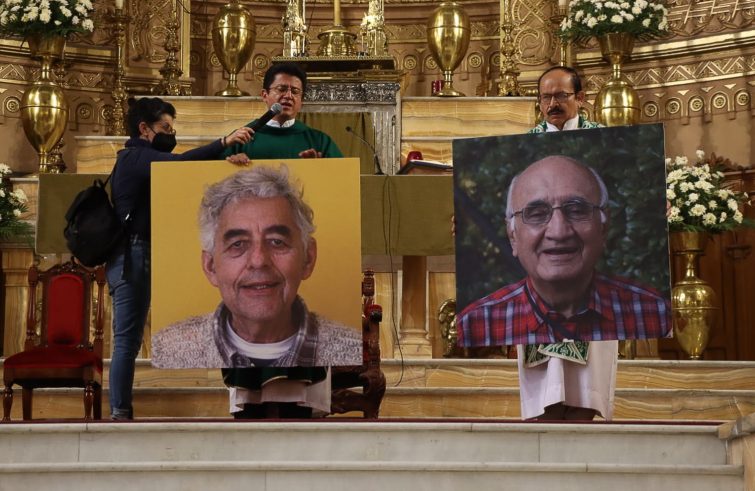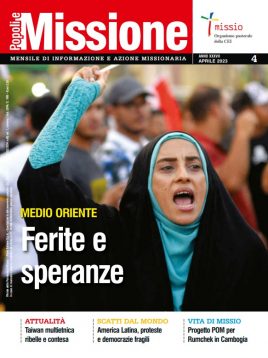
Criminal violence of drug cartels in Mexico has reached record levels, with an increasing tendency to target Catholic priests. Suffice it to mention that the Bishops’ Conference (CEM) of Mexico called on all parishes to display photos of the slain nuns and priests in their churches, as of last summer. The initiative came about after the murder of two Jesuit priests, on 20 June 2022, inside the church of Cerocahui, a small village in the Sierra Tarahumara, Chihuahua State, Mexico, gunned down by local boss José Noriel Portillo Gil, aka ‘El Chueco’, a fugitive feared throughout the region.
 Threats and assaults. Dual murders are a recurring tragedy in Mexico, where a dozen priests have already been killed under the presidency of López Obrador – ‘Amlo’ as everyone calls him. Despite Pope Francis’ denouncement, nothing has changed and the criminal syndicates continue operating with a degree of impunity that has sadly degenerated into ‘routine’. The Inter-American Commission on Human Rights (IACHR) requested at the end of January this year that the government protect the seven Jesuit priests, three nuns and a community leader holding out in Cerocahui, as they had “suffered threats and attacks from organised criminal groups, which prevent them from conducting their pastoral and outreach activities in the area.”
Threats and assaults. Dual murders are a recurring tragedy in Mexico, where a dozen priests have already been killed under the presidency of López Obrador – ‘Amlo’ as everyone calls him. Despite Pope Francis’ denouncement, nothing has changed and the criminal syndicates continue operating with a degree of impunity that has sadly degenerated into ‘routine’. The Inter-American Commission on Human Rights (IACHR) requested at the end of January this year that the government protect the seven Jesuit priests, three nuns and a community leader holding out in Cerocahui, as they had “suffered threats and attacks from organised criminal groups, which prevent them from conducting their pastoral and outreach activities in the area.”
Killings, impunity. After more than seven months since the killing of the two priests, the area is still plagued by insecurity. Extortion, threats, kidnappings, land occupation and illegal deforestation by drug syndicates are ongoing, as the Jesuits constantly denounce, risking their lives. While the IACHR has asked for their protection on the grounds of their “serious situation of danger”,
it took the umpteenth massacre – a commando of thirty drug gang gunmen shootout against as many policemen on February 21st – for Mexican authorities to intervene.
On February 25, a team of experts, members of the State Unit for the Protection of Human Rights Defenders from the Attorney General’s Office in Chihuahua finally travelled to the Sierra Tarahumara region. The clerics of the Jesuit community had released an official communiqué in December 2022 asking “government authorities to review the region’s public security strategy”, as reported by Mexican daily La Jornada. “To date, we are awaiting the swift justice that had been promised. We acknowledge the efforts but we condemn the shameful impunity witnessed in the face of these and thousands of other murders,” the Jesuits had denounced.
Priests killed inside their church. “The local population has spent so many years in the grip of organised crime that fear has become part and parcel of their daily lives. It’s a very sad situation. The fact that they murdered our priests on the altar of their church, a place that served as a sanctuary, is extremely tragic. They attacked a place that the community considered to be safe”, explained Jorge Atilano González Candia, assistant to the Jesuit Provincial for social works in Mexico. Actually, since the murder of the two priests last year, there has been heightened insecurity and Sierra Tarahumara and the Jesuits who remained are “extremely defenceless and vulnerable”, because the threats have increased dramatically. In fact, drug cartels closely monitor the members of the Cerocahui community. They warned them that if they gave any indication of ‘el Chueco’s’ refuge, “they would kill them like dogs”, said Father Javier Ávila, more commonly known as Father Pato, president of the Solidarity and Human Rights Defence Commission in Chihuahua.
Drug trafficking pays the bills. Father José Francisco Méndez Alcaraz – Father Pepe as he is known to his friends – is the spokesperson for the Jesuits in Mexico. He was closely acquainted with Father Javier Campos and Father Joaquín Mora. ‘Popoli e Missione’ interviewed him and, in his view, poverty is the main factor behind Mexico’s high level of violence.
“Many young people join drug cartels because they prefer to have a short life but one in which they can have something to offer their mothers, especially building them a decent home.”
Then there is the ‘narrative’ magnified by the media. “Here in Mexico – Father Pepe explained – films, cinema and television place great emphasis on weapons-based power, a source of financial wealth even for adolescents, a source of power that wins over many women. This detrimental form of communication extols them as heroes or role models, as in the Netflix series ‘Narcos’ or ‘La reina del sur'”.
The social fabric is being destroyed. According to the spokesperson, the disintegration of the social fabric is also a cause of violence. “Ever more often, we see that individuals and families are more closed in on themselves. There used to be widespread solidarity in Mexico between relatives, between neighbours, there was a solid social fabric. The sense of belonging to a community was rooted in the Catholic tradition of neighbourly solidarity. When someone heard a child or an adult crying, the neighbours would go and check what was going on. This no longer happens; they are afraid and don’t want to get involved.”
Drugs and mining. Sierra Tarahumara, the area where the Jesuit priests are exposed to acts of violence from criminal gangs, is a beautiful coniferous forest, with plenty of gorges, slopes, mountains, a few valleys and some rivers. Violence in this area is mostly linked to drug trafficking, but also to mining. “There are large mining companies in the area, Mexican and Canadian. And marijuana is grown on the uneven slopes, an ideal location because it is partly hidden”, Father Pepe explained. This part of the world is inhabited by the ‘Rarámuri’, an indigenous people who lead a simple life.
Education and peace project. Today, the Society of Jesus (there are 246 Jesuits in Mexico distributed in 14 states) is supporting the development of the people of the Sierra Tarahumara:
“We run boarding schools for the Rarámuri children, a clinic and a hospital. We are also involved in the area of education, both professional and religious, of Christian and human values.”
At the national level, “the Church is working to ensure that certain national sectors devote greater attention to the community, to the common good, to the Social Doctrine of the Church. As Jesuits, we also run a project called ‘This Way to Peace’, aimed at rebuilding the social fabric. In the places where this methodology has been applied, we registered a positive experience,” assures Father Pepe.
*Popoli e Missione










